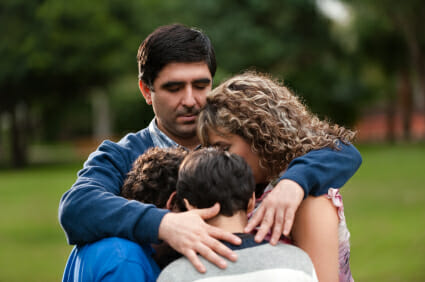While visiting the north of Galilee, in the villages around Caesarea Philippi, Jesus asked his disciples what they thought of him. Peter, speaking for them all, declared his belief that he was the Christ, the Messiah awaited for centuries. To avoid misunderstandings, Jesus explained how his mission should be understood. He would indeed free his people, but in an unexpected manner, paying in person. He would suffer greatly, be condemned, killed and, after three days, rise again. Peter did not accept this vision of the Messiah. As many others of his time, he imagined the Messiah to be someone who would act with power and strength, defeating the Romans and putting the nation of Israel in its proper place in the world. He reprimanded Jesus, who in turn said to Peter: ‘You are not thinking in God’s way, but as humans do’ (see Mk 8:31-33).
Jesus set off again, this time in the direction of Jerusalem, where he was to fulfil his destiny of death and resurrection. Now that his disciples knew he was going to his death, would they want to carry on following him? Jesus’ conditions are clear and demanding. He called the crowd and his disciples together and he said to them:
‘If any want to become my followers, let them deny themselves and take up their cross and follow me.’
They had been fascinated by him, the Master, when he walked by the lakeside, as they cast their nets to fish, or at the tax booth. Without hesitation they had left their boats, nets, booth, father, house, family to go running after him. They had seen him work miracles and had heard his words of wisdom. Until that moment they had followed him in a spirit of joy and enthusiasm.
Following Jesus, however, was something that required far more. Now what it meant to share fully in his life and destiny became clear: failure and hostility, even death, and what a death! It was the most painful, the most shameful of deaths; the one reserved for murders and the most vicious criminals. A death the Scriptures called ‘cursed’ (see Dt 21:23). Just mentioning the ‘cross’ caused terror. It was almost unspeakable. This is the first time the word appears in the Gospel. Who knows what impression it made on his listeners?
Now that Jesus had clearly affirmed his own identity, he could demonstrate with equal clarity the identity of someone who was his disciple. If the Master is one who loves his people to the point of dying for them, taking their cross upon himself, so too his disciple, to be such, must set aside his or her own way of thinking and share in the entire way of the Master, starting with the cross:
‘If any want to become my followers, let them deny themselves and take up their cross and follow me.’
Being Christian means being another Christ, to have ‘the same mind that was in Christ Jesus’ who ‘humbled himself and became obedient to the point of death—even death on a cross’ (Phil. 2:5,8), to be crucified with Christ, to the point of being able to say with Paul: ‘it is no longer I who live, but it is Christ who lives in me’ (Gal. 2:20), knowing nothing ‘except Jesus Christ, and him crucified’ (1 Cor. 2:2). It is Jesus who continues to live, die, rise again in us. This is the greatest desire and the ambition of the Christian, the thing that has created the great saints: being like the Master. But how can we follow Jesus and become like this?
The first step is to ‘deny yourself’, distance yourself from your own way of thinking. It was what Jesus asked of Peter when he reprimanded him for thinking in the manner of human beings and not God. We too, like Peter, wish at times to assert ourselves in an egotistical manner, or at least according to our own criteria. We look for easy and immediate success, with every difficulty smoothed away; we look with envy at those rising up the career ladder; we dream of having a united family and of building around us a caring society and a Christian community without our having to pay a high price.
Denying ourselves means entering into God’s way of thinking, which is how Jesus thought and is displayed in his way of doing things: the logic of the grain of wheat that must die to bear fruit, of finding more joy in giving than in receiving, of offering one’s life out of love, in a word, of taking up the cross:
‘If any want to become my followers, let them deny themselves and take up their cross and follow me.’
The cross, the ‘daily’ cross as Luke’s gospel calls it (Lk 9:23), can have a thousand faces: an illness, a job loss, the inability to sort out family or work problems, the sense of failure in being unable to create genuine relationships, the feeling of impotence before the world’s massive conflicts, indignation at the recurrent scandals of society… The cross does not need to be sought, it comes on its own, perhaps when we least expect it and in ways we would never have imagined.
Jesus invites us to ‘take it up’, not resigning ourselves to endure it as an evil we cannot avoid, not letting it come down on us and crush us, not even putting up with it by acting with stoicism and detachment. Instead welcome it as a sharing in his cross, as a possibility of being his disciples even in those situations and live in communion with him even in that suffering, because he first took our cross on his shoulders. In every suffering, whatever it may be, we can thus find Jesus who has already made it his own.
Igino Giordani saw in this an instance of role reversal with Simon of Cyrene who bore Jesus’ cross: the cross ‘weighs less if Jesus becomes our Cyrenian.’ And it weighs still less, he goes on to say, if we bear it together. ‘A cross borne by one person ends up as crushing; a cross borne together by several persons with Jesus in their midst, which is to say with Jesus taking it up as a Cyrenian, grows lighter: an easy yoke. A climb, with many climbers roped together, in agreement with one another, becomes a joy, even while the ascent is being made.’
So we are to take up the cross and bear it with him, knowing that we are not alone in carrying it because he bears it with us. This is relating, it is belonging to Jesus, even to the point of full communion with him, to the point of becoming another him. And this is the way that we follow Jesus and become true disciples. The cross will then become for us, as for Christ, ‘the power of God’ (1 Cor. 1:18), the way of resurrection. In every weakness we will find strength, in every darkness light, in every death life, because we will find Jesus.
Fabio Ciardi


 Italiano
Italiano Español
Español Français
Français Português
Português


Gracias lo necesitaba
para refletir
For some days ago. we-two Volunteers of God- promised each other to keep Jesus in our midst and then we met one couple who were separated by bitter financial problem and many conflicts among them. Their daughters also refused to meet their father for the cumulative family trouble. So they don’t meet each other for two years. At first it was hard to start talking, but little by little we can talk to the point of expressing the Word of Life;”without having to pay a high price, we dream of having united family” About two hours, we communicated each one’s situation of our life and finally the couple agreed to try more so as to live according to the light of Chiara. After this meeting we went to one restaurant for celebrating good conclusion. Today their daughter agree to meet their father in a restaurant if we go to the place.
thanks alot because you change people’s lives for the best
Merci pour le partage de cette parole de vie
Je viens de comprendre que la souffrance seule ne suffit pas mais qu’il faut sortir et suivre Jesus abandonné, au Calvaire, sur la croix
Viver com Jesus Cristo é DOAÇÃO TOTAL ou nada …….Beijos e abraços
Beautiful!
Bellissima Parola di Vita di questo mese, ci rimette nell’essenziale della vita….mi permetto solo di aggiungere che “il prendere la croce” non ha il fine solo di trovare Gesù in ogni dolore, e di esserGli unito. La croce per Gesù è stata sempre vista nella prospettiva della salvezza…dunque prendere la croce, e uscire fuori di noi, dalle nostre case, lanciarsi ad amare chi soffre, consolare chi piange, soccorrere, aiutare…tutto per costruire il mondo unito.
Grazie e buon mese di marzo
Muchas gracias!….1
Este sábado vive a palavra de março renunciando a mim mesma ajudando a minha cunhada que tinha óbito e acompanhei-lhe pq deixe as tarefas para ir com ela ao funeral. outra renuncia estava muito cansada com as tarefas domesticas mesmo assim fiz coragem de lavar o carro para o esposo não gastar dinheiro fora pq precisávamos para comprar combustível estamos juntos na palavra de vida